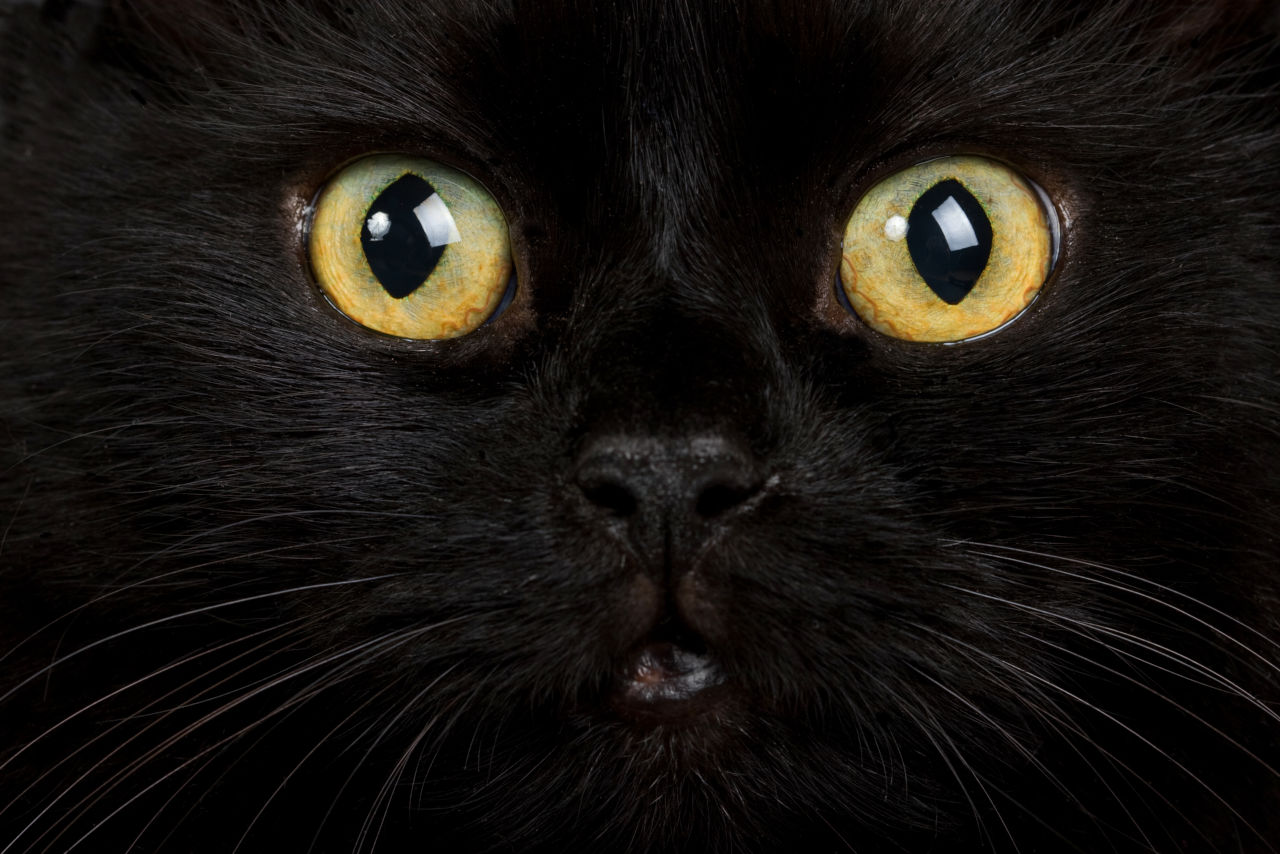Cats move at night with grace and ease, as if they could see perfectly. While cats cannot see in complete darkness, they have better night vision than humans. The cat’s eyes glow like little flashlights when they do this.
The glow of the cat’s eyes in the dark is caused by the tapetum lucidum. When a cat dilates its pupils to adjust to low light, the light penetrates the retina. It is then reflected back by an additional layer behind the retina, the tapetum lucidum. This provides the colorful, luminous effect of cat’s eyes as light reflects off the cells behind the retina.
The color in which a cat’s eyes glow at night depends on a number of factors. Common hues include green, blue, and gold.
Why Do Cat Eyes Glow at Night?
A cat’s glowing eyes can be compared to the red-eye effect in photography.
When we are photographed with a flash, the retina in our eyes reflects the bright light. This reflection appears red because the photograph captures the reflections of the blood vessels behind the eye.
Cat’s eyes usually glow a different, bright color.
The reason for this is the tapetum lucidum, a layer of reflective cells behind the cat’s retina. In the original Latin, tapetum lucidum means “luminous layer”.
The tapetum lucidum is like a second visual aid for the cat. The vision of cats is based on the fact that light enters the eye, and the retina reflects this light.
The tapetum lucidum absorbs the light that has escaped the retina, improving the cat’s night vision by about 44%.
This reflection process creates the glow effect. Because cats have such large eyes, a lot of light is absorbed.
The cells in the tapetum lucidum reflect this light, causing the cat’s eyes to glow. The brighter a cat’s eyes glow, the stronger its vision in poorly lit areas.
Can Cats See in the Dark?
The cat eye is large and round, so it improves peripheral vision. In addition, this also improves the cat’s night vision.
The size of the cat’s eye ensures that it absorbs and reflects even the weakest light.
Streetlights or even moonlight provide enough light for a cat to see well. This means that a cat can detect and hunt prey at night.
In addition, however, cats can use their whiskers to orient themselves in the dark.
Cats’ eyes glow in the dark like small but penetrating flashlights. This may look a little scary, but it’s positive because it means your cat’s night vision is fully functional.
Why Do Cat Eyes Glow Different Colors?
The color in which a cat’s eyes glow in the dark depends on several factors. The pigmentation of the eyes and the coat are the most critical factors.
Age also changes the color of the cat’s eyes at night. The older the cat gets, the less effective the Tapetum lucidum is.
You may notice at some point that your cat’s eyes glow a different color than usual.
The glow of a cat’s eyes does not come from the iris itself. It is a composition of cells in the cat’s tapetum lucidum that enhances this coloration.
Zinc and riboflavin are the most abundant elements in the cat’s tapetum lucidum. The latter, in particular, is widely distributed in the cat’s eye. Excess or deficiency of these elements affects eye color at night.
Cat Eyes That Glow Green
Green is the most common color for cat eyes that glow in the dark. This is partly because shades of green are among the most common eye colors in cats.
The following cat breeds have green eyes in light and dark:
- Abyssinian cat
- Egyptian Mau
- Havana Brown
- Norwegian Forest cat
- Russian Blue
- Sphynx cat
- Turkish Angora
Even if a cat has green eyes, not all cats’ eyes glow the same shade. There are subtle differences in shades of green, even among identical breeds and siblings. Also, note that other iris colors may still glow green at night.
This is a reaction to the cells in the tapetum lucidum.
Cat Eyes That Glow Blue
All kittens are born with blue eyes.
This means that especially young cats have eyes that glow blue at night.
Over time, the color of many cats’ eyes changes. However, blue eyes are also common in certain adult cat breeds.
Some examples of blue-eyed cats are:
- Balinese cat
- Burmese cat
- Himalayan cat
- Oriental Longhair
- Persian cat
- Siamese cat
If your cat’s eyes are generally blue and glow that color, it’s rarely a cause for concern.
However, if your cat has white fur and blue eyes, you should look for black spots in the eye. This indicates that the cat retains age-appropriate vision.
Unfortunately, cats with white fur and blue eyes without these markings can be prone to early blindness. This causes the eyes to glow red at night. The tapetum lucidum does not function properly.
Cat Eyes That Glow Yellow
Siamese cats have blue eyes, but their eyes often shimmer yellow or gold. This natural characteristic of the Siamese cat is not a cause for concern.
In other breeds, yellow eyes may be a symptom of riboflavin in the cat’s diet. If this vitamin is consumed in excess, it can cause liver damage.
Fortunately, such toxicity is rare in cats. Cats naturally have more riboflavin in their tapetum lucidum than zinc.
If you are concerned, you should increase the consumption of animal meats and fats, as this will increase the cat’s taurine intake, which counteracts riboflavin and improves night vision.
A deficiency of this vitamin is more harmful than an excess.
Cat Eyes That Glow Red
If your cat’s eyes glow red in the dark, this indicates a failure of tapetum lucidum.
This has the same effect as red eyes in photography.
Your cat’s eyes reflect the muscle behind the retina, but the light does not reach the tapetum lucidum. This is common in older cats as vision decreases with age.
Red eyes can also be the result of a surprise light source. When a cat’s eyes are not expected to be flooded with light, they quickly dilate, resulting in a bloodshot appearance.
However, this should be a temporary phenomenon and not occur regularly.
Cat Eyes That Shine in Two Different Colors
When a cat has unequal eye colors, this is quite natural. The tapetum lucidum then reflects the different nuclear colors.
If you notice this only from certain angles, it is only the reflection of light from different positions.
But if the problem occurs abruptly at some point and persists, it may also be that the vision in one eye is failing.
When Cat Eyes Do Not Glow in the Dark
A cat’s eyes should always glow in low-light conditions. If your cat’s eyes don’t glow in the dark, he may not be able to see well.
A lack of bright glow indicates that light is not reaching the retina. This, in turn, means that the light is not reaching the tapetum lucidum.
As a result, your cat has difficulty seeing in the dark. These circumstances indicate a general vision problem.
The most common causes of vision problems in cats include:
- Glaucoma
- Conjunctivitis
- Cataracts in one or both eyes
- Viral infections
- Taurine insufficiency
- Vitamin A insufficiency
The tapetum lucidum needs some light to reflect it. Cat eyes are no more functional in complete darkness than a human’s.
When you turn on a light, the cat’s eyes should constrict for self-protection. This prevents the light from reaching the retina and the tapetum lucidum.
You can check your cat’s vision at home. Do this in daylight when your cat is awake and alert. Techniques for at-home eye testing include:
- Point a weak laser pointer at your cat and see if he responds.
- Drop a feather or other light, quiet object in your cat’s field of vision and see if the cat chases it.
- Place soft, non-hazardous objects in your cat’s path to food, water, and litter box.
- Shine a dim flashlight into your cat’s eyes and check if the eye contracts.
- Watch your cat climb scratching posts and stairs and ensure it moves safely.
If your cat does not respond to these stimuli, see a veterinarian. Temporary light blindness in cats can often be corrected.
My Cat’s Eyes Glow in Daylight
A cat’s eyes should only light up at night, especially for long periods of time. Something is wrong if your cat’s eyes seem to glow in bright light during the day.
This indicates that your cat’s pupils are unnecessarily dilated and taking in more light than is necessary. When exposed to a direct light source, cats should constrict their eyes.
Explanations for cat eyes glowing during the day include:
- Ingestion of toxins
- Stress and anxiety
- Hypertension (high blood pressure)
- Key-Gaskell syndrome
- Decreasing vision
Occasional shining of the eyes in daylight is not a medical problem. Your cat may have dilated its eyes due to increased interest or fascination, perhaps because it spied on prey with its peripheral vision.
Conclusion: Why Do Cat Eyes Glow in the Dark?
Cat eyes that glow in the dark are not creepy or scary, although it may sometimes seem that way. It is part of the functional vision of cats at night or in gloomy conditions.
The glow of cat eyes is caused by the tapetum lucidum, which reflects light in the cat’s eye.
Cat eyes can glow in a variety of colors. The most common colors are green, blue, and yellow. Cat eyes that glow red indicate a vision problem.


